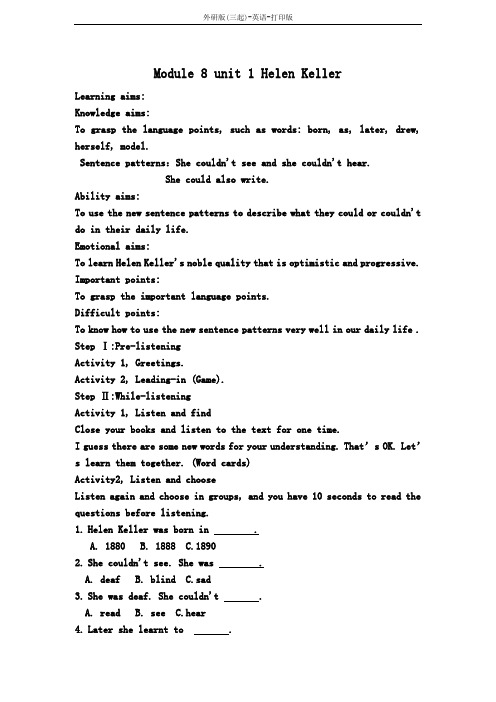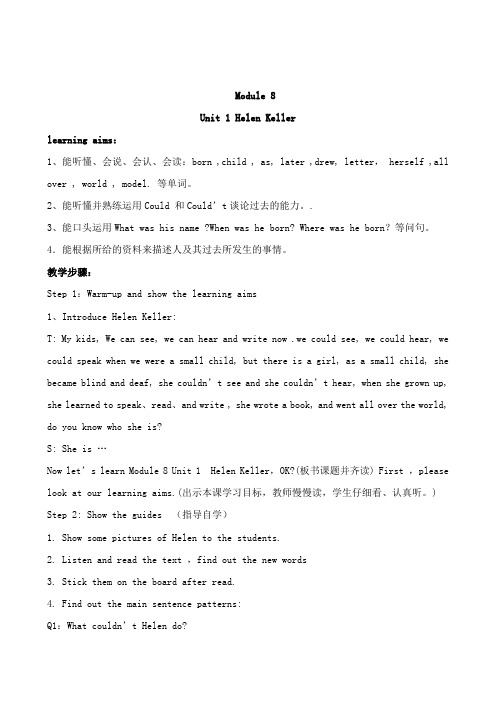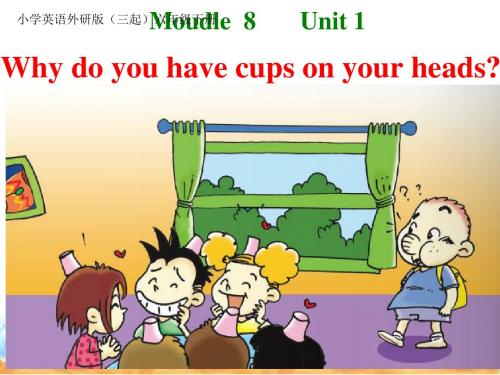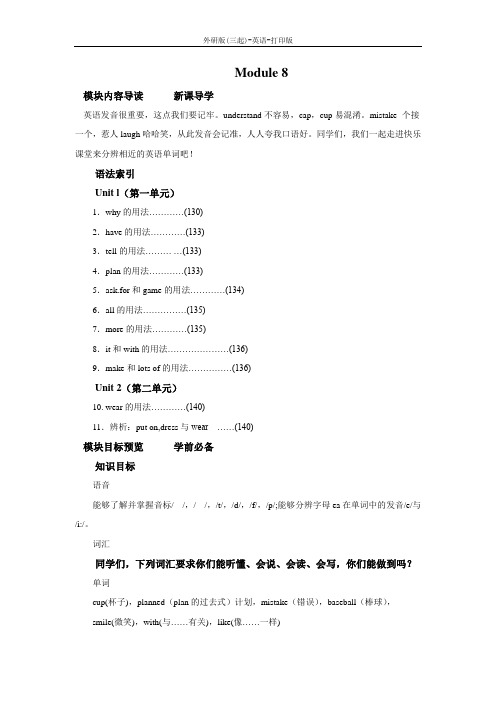外研社六年级英语下册 外研版(三起)六下英语:M8U1
新外研版六年级英语下册Module 8 Unit 1 -Where is the...句型操练

on your heads? Wheren the table 在书架里 in the bookcase 在椅子下面 under the chair 在我的书包里 in my schoolbag 在沙发上 on the sofa 在你的书桌下面 under your desk
Exercises
1. 在抽屉里面 in__t_h_e_d_r_a_w__e_r_____
2. 在桌子底下 u_n_d_e_r_t_h_e__ta_b_l_e____
3. 在柜子上面 o_n__t_h_e_d_r_e_s_se_r_____
4. on the floor
_在__地__板__上_________
4. A: _W__h_e_r_e_a_r_e_ her dictionaries? B: They are ___________. on the chair
5. A:W__h_e_r_e_i_s the cat? B:__It__ is _u_n__d_e_r_ the tree.
不习惯读书进修的人,常会自满于现状,觉得再没有什么事情需要学习,于是他们不进则退。经验丰富的人读书用两只眼睛,一只眼睛看到纸面上的话,另 一眼睛看到纸的背面。2022年3月29日星期二2022/3/292022/3/292022/3/29 书籍是屹立在时间的汪洋大海中的灯塔。2022年3月2022/3/292022/3/292022/3/293/29/2022 正确的略读可使人用很少的时间接触大量的文献,并挑选出有意义的部分。2022/3/292022/3/29March 29, 2022 书籍是屹立在时间的汪洋大海中的灯塔。
5. under the tree __在__树__下___________
六年级下册英语m8u1课文内容翻译

六年级下册英语m8u1课文内容翻译案例一:Look,listen and say部分翻译Where's my bag?我的包在哪里?l put it on your bed.我把它放在你的床上了。
Why can't I see it? Oh,it's under my bed.我为什么看不见它?哦,它在我的床下面。
案例二:Listen and read部分翻译Sam came the classroom and saw some friends there. They had cups on their heads.“Why do you have cups on your heads? Why are you laughing?”he asked.萨姆进入了教室并在那儿看见了一些朋友。
他们的头上有杯子。
“为什么你们的头上有杯子?为什么你们在笑?”他问。
Daming told him the story.They planned to play a baseball game.Amy asked Lingling to bring some caps for the game.ButLingling brought some cups.They all laughed. Then they put the cups on their heads and laughed more.大明告诉了他这个故事。
他们计划打一场棒球赛。
埃米让玲玲为比赛拿来一些帽子,但是玲玲拿来了一些杯子。
他们都笑了。
然后他们把杯子放在了他们的头上,笑得更厉害了。
Sam a miled.“lt's easy to make mistakes whit English words,”he said.“I make lots of mistakes with Chinese words too.Now look what's in my bag!”Sam opened his bag. here were baseball caps!“Hooray!” everyone shouted.They put the caps on.Then they went to the playground and played.baseball together.萨姆笑了。
外研版-英语-六年级下册-6B M8 Unit1教案

Module 8 unit 1 Helen KellerLearning aims:Knowledge aims:To grasp the language points, such as words: born, as, later, drew, herself, model.Sentence patterns:She couldn't see and she couldn't hear.She could also write.Ability aims:To use the new sentence patterns to describe what they could or couldn't do in their daily life.Emotional aims:To learn Helen Keller's noble quality that is optimistic and progressive. Important points:To grasp the important language points.Difficult points:To know how to use the new sentence patterns very well in our daily life . Step Ⅰ:Pre-listeningActivity 1, Greetings.Activity 2, Leading-in (Game).Step Ⅱ:While-listeningActivity 1, Listen and findClose your books and listen to the text for one time.I guess there are some new words for your understanding. That’s OK. Let’s learn them together. (Word cards)Activity2, Listen and chooseListen again and choose in groups, and you have 10 seconds to read the questions before listening.1.Helen Keller was born in .A. 1880B. 1888C.18902.She couldn't see. She was .A. deafB. blindC.sad3.She was deaf. She couldn't .A. readB. seeC.hearter she learnt to .A. speakB. singC.draw5.She wrote a book about .A. herselfB. the worldC.her teacher6.She is a for blind people.A. teacherB. modelC.studentActivity3, Listen and answerListen again and answer the questions in groups, and you have 5 secondsto read the questions before listening.1.When and where was Helen Keller born?2.What happened to (发生) Helen Keller as a small child?3. How did she learn to speak?4.Why is she famous?Activity4, Listen and repeatListen again, and repeat sentence by sentence. Pay attention to the pronunciation and stress.StepⅢ: Post-listeningListen again and complete the passage in groups.Helen Keller in America in 1880. She blind anddeaf a small child. She and . Latershe had a , she in Helen's hand.Then she learnt and . She also write. She wrote a bookabout . She went . And she 87.Helen Keller is a for blind people and for you and me.StepⅣ: practice1.Helen Keller see but she learn. She hear but she speak.2.Zhang Haidi walk, but she write.3.Tai Lihua hear the music, but she dance.4.Peter had a cut in his left leg. He go to school, but he study at home.5.My bike was broken. I ride to school, but I goto school on foot.6.The child had a pain in his right hand. He write, but he read.7.When I was a baby, I see but I read. I hear but I talk. I walk, but I learnand I play.StepⅤ: DevelopmentRetell the text according to the key words .Born----child---Education---Activities-----Things----Death----HonorsStepⅥ: SummaryWhat have we learn t this lesson?Words: born, as, later, drew, herself, model.Sentence patterns:She couldn't see and she couldn't hear.She could also write.Use the new sentence patterns to describe what they could or couldn'tdo in their daily life.To learn Helen Keller's noble quality that is optimistic and progressive.StepⅦ: Homework1. Write six sentences with "could, couldn't" and what we have learnt to describe what you could or couldn't do in your daily life.2. Write a passage to introduce Zhang Haidi as Helen Keller.(You can choose either of them )Words of Helen Keller:Although the world is suffering, it is also full of the overcoming ofit.虽然世界多苦难,但是苦难总是能战胜的。
最新外研版小学英语六年级下册M8U1公开课教学设计

Module 8Unit 1 Helen Kellerlearning aims:1、能听懂、会说、会认、会读:born ,child , as, later ,drew, letter, herself ,all over , world , model. 等单词。
2、能听懂并熟练运用Could 和Could’t谈论过去的能力。
.3、能口头运用What was his name ?When was he born? Where was he born?等问句。
4.能根据所给的资料来描述人及其过去所发生的事情。
教学步骤:Step 1:Warm-up and show the learning aims1、Introduce Helen Keller:T: My kids, We can see, we can hear and write now .we could see, we could hear, we could speak when we were a small child, but there is a girl, as a small child, she beca me blind and deaf, she couldn’t see and she couldn’t hear, when she grown up, she learned to speak、read、and write , she wrote a book, and went all over the world, do you know who she is?S: She is …Now let’s learn Module 8 Unit 1 Helen Keller,OK?(板书课题并齐读) First ,please look at our learning aims.(出示本课学习目标,教师慢慢读,学生仔细看、认真听。
小学英语外研版(三起)六年级下册M8

Read part 3 in your groups and fill in the blanks
1. It's easy to make mistakes with ____ English words. 2. I make _____ lots _____ of mistakes with Chinese words, too. 3. "What's ____ in my bags?" Sam opened his caps bag. There were baseball ________! 4.They put the caps ______ on their heads.
cap cup
interesting words
ship--sheep cat--cut bear--pear pen--Ben bed--bad
— Why do they laugh?
— Because Lingling made a mistake with English words.
Pra____________ I'm sad.
eat hungry
A: Why _________________________ are you eating? B: Because _____________________ I'm hungry.
Discuss in your groups
小学英语外研版(三起)六年级下册
Moudle 8
Unit 1
Why do you have cups on your heads?
Task(任务): Discuss(讨论)in groups what mistakes you usually make in your English study and how to avoid(避免) them. Teaching aims(教学目标): 1. All of you can master the words: cup, classmate, baseball, brought, more, make mistakes. 2. All of you can understand and express "Why do you have cups on your heads?" 3. Most of you can write 4-5 sentences to explain why. 4. You all can find out what mistakes you usually make in your English study and how to avoid(避免) these mistakes.
外研版小学英语六年级下册M8U1课件

Love the world, Love our life
Complete the sentence.
eat a hamburger listen to music read a book
speak English write letters watch TV
play the trumpet clean the classroom
She was ______ born in Hubei in 1976.As a small child, she ___________ became deaf. She _________ hear or talk. When She was couldn’t 5 years old, she ________ learned to dance. She likes dancing very much. In 2005, she danced Qian Shou Guan Yin. model for us. She is a _________
lived to be 87
Let’s check!
Helen Keller was born in
.As asmall child,
she became
.She couldn’t see and she
.The teacher
couldn’t ter, Helen had a drew letters in Helen’s and .She could also
. Helen learned to . She wrote a .She lived to
book about herself. She went be 87.Helen Keller is a for us.
外研版(三起)-英语-六年级下册--外研版三起Module 8 Unit 1教材同步讲解

例句:I like to play baseball.我喜欢玩棒球。
④smile/smal/v.(动词)微笑;挖.(名词)微笑
短语:wear a smile面带笑容big smile热情的微笑
例句:They all smiled at the good news.听到这个好消息,他们都喜笑颜开。
是连词,作“因为”讲,其后要接一个句子来陈述原因、理由。例如:
-Why do they want to go to China?他们为什么想去中国?
-Because they want to learn Chinese.因为他们想学习汉语。
【即学即用】
do you like eating fish? -Because it's delicious.
He smiled at her.他对她微笑。
⑤mistakes /mɪ'stek/n.(名词)错误
同义词:error错误,过失
短语:bad mistake严重的错误(过失)sad mistake惨痛的错误(过失)
例句:We all make mistakes,我们都会犯错误。
I made a mistake about the time.我把时间搞错了。
they put the cups on their heads and laughed more.
大明告诉了他这个故事。他们打算玩一个棒球游戏。埃米让玲玲为这个游戏拿来一些帽
子。但是玲玲拿来了一些杯子。他们都笑了。然后他们把这些杯子放在他们的头上并
大笑。
Sam smiled.④ "It's easy to make mistakes⑤with⑥ English words," he said. "I make lots of mistakes with Chinese words too. Now look what's in my bag! "Sam opened his bag.There were baseball caps " Hooray!"everyone shouted. They put the caps on Then they went to the playground and played baseball together.
外研三起六下M8U1课件 PPT

大家好
23
laugh
cry
happy
sad
Why is he laughing? Why is he crying? Because he is happy. Because he is sad.
shout angry
sleep tired
Why is he shouting? Why is he sleeping?
A. caps
B. cups
大家好
8
3. What did Lingling bring? Lingling brought some_____.
A. caps
B. cups
大家好
9
大家好
10
大家好
11
Listen and repeat Para.3, then answer.
1. What were there in Sam’s bag? There were baseball caps.
By Ms Chen
大家好
1
Sam can’t find his bag. Is it on his bed?
No, it isn’t.
大家好
2
under his bed
大家好
3
Sam came into the classroom and saw some friends there. They had cups on their heads.
8. baseball caps
棒球帽
9. put the caps on
戴上帽子
10. play baseball
打棒球
大家好
16
写出动词的过去式
- 1、下载文档前请自行甄别文档内容的完整性,平台不提供额外的编辑、内容补充、找答案等附加服务。
- 2、"仅部分预览"的文档,不可在线预览部分如存在完整性等问题,可反馈申请退款(可完整预览的文档不适用该条件!)。
- 3、如文档侵犯您的权益,请联系客服反馈,我们会尽快为您处理(人工客服工作时间:9:00-18:30)。
Module 8 Unit 1
Why do you have cups on your heads?
Head and Shoulder knees and toes Knees and toes knees and toes Head and shoulder knees and toes Eyes ears mouth nose
Why do you have cups on your heads? 你们为什么把杯子放在头上呢? Why are you laughing? 你们为什么笑啊?
cup 杯子 /ʌ/
laugh /a:/
“Why + 一般疑问句”用来询问原因、理由。
.
Why are you late? 你为什么迟到了? 答句一般用“Because + 陈述句” Because I missed the bus.
mistake 错误
mistakes(复数)
make mistakes 犯错误
Sometimes we ____m__a_k_emistakes in the test. I __m__a_d_e_ a mistake in class yesterday.
Ask and answer.
Sam: Why do you have cups on your heads?
Daming told him the story. They planned to play a baseball game. Amy asked Lingling to bring some caps for the game. But Lingling brought some cups. They all laughed. Then they put the cups on their heads and 都 laughed more.
计划 Daming told him the story. They planned to play a baseball game. Amy asked Lingling to bring some caps 棒球比赛 for the game. But Lingling brought some cups. They all laughed. Then they put the cups on their heads and laughed more.
更多地 Why are they laughing?
Because they put the cups on their heads.
Then they put the cups on their heads and laughed more.
more 更多地 / ɔ:/
You should sleep more. 你应该睡得更多。
Why _d__id_ he go to China? Because he wanted to learn Chinese. Why __d_o_ you like eating fish? Because it’s decilious.
Read and answer.
Why do they have cups on their heads? Why are they laughing?
What’s on their head? _______S_o_m__e_c_u_p_s_.__ Are they happy? _____Y_e_s_, _th_e_y__a_re_.___
Let’s read.
What are Sam’s questions?
Sam came into the classroom and saw some friends there. They had cups on their heads. “Why do you have cups on your heads? Why are you laughing?” he asked.
She is __la_u_g_h_i_n_g.
He is __c_ry_i_n_g_.
She is __s_h_o_u_ti_n_g.
He is __e_a_t_in_g_.
Can you guess?
laugh happy
Why is she laughing? Because ___s_h_e_i_s_h_a_p_p_y_.
Why do they have cups on their heads?
Because Amy asked Lingling to bring some caps for the game, but Lingling bought some cups.
baseball 棒球 /ei/
cap 帽子 /æ /
Friends: Because______________ _____________________
Sam: Why are you laughing? Friends: Because_______________
______________________
Look and answer
What are they doing?
1. Read the text of activity 2. 2. Make emoticons, then practice to ask and answer: Why …? Because …
Read and choose.
Which do you enjoy _____C___, swimming or walking? A. much B.many C.more
smile – smiled 微笑 /ai/
laugh
smile
say – said 说 /e/
shout – shouted 叫喊 /aʊ/
Read and draw a line under the key sentences.
What did Sam say?
Sam smiled. “It’s easy to make mistakes with English words,” he said. “I make lots of mistakes with Chinese words too. Now look what’s in my bag!” Sam opened his bag. There were baseball caps! “Hooray!” everyone shouted. They put the caps on. Then they went to the playground and played baseball together.
cry
sad
shout angry
eat
hungry
crying he is sad.
Why are you shouting? Because she ting? Because he is hungry.
1. 词汇:cup,plan - planned,baseball,more, smile - smiled,mistake,with,said 2.句型: why do you have cups on your heads? Why are you laughing?
plan – planned 计划
“plan to do sth.”表示“ 计划. 干……” I plan to plant some vegetables in the garden. 我计划在花园里种一些蔬菜。
He planned ___t_o_l_e_a_v_e Beijing on Monday. 他计划周一离开北京。
What’s in the picture? There is ___________________________.
Where’s the bag? ______It_’_s_u_n_d_e_r_t_h_e__b_e_d_. _____ Who put it there? ___T_h_e_d_o_g__p_u_t_i_t_u_n_d_e_r_t_h_e_b_e__d.
